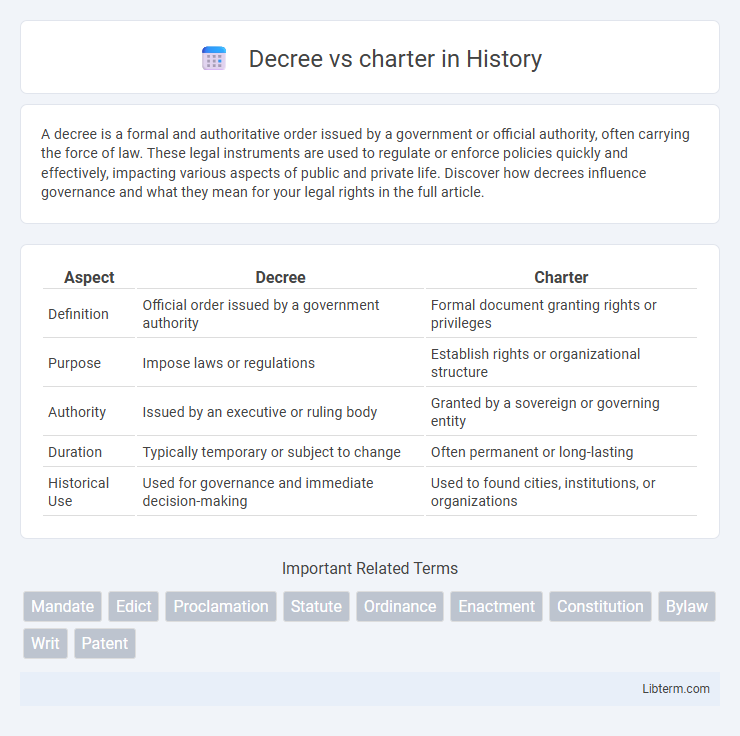A decree is a formal and authoritative order issued by a government or official authority, often carrying the force of law. These legal instruments are used to regulate or enforce policies quickly and effectively, impacting various aspects of public and private life. Discover how decrees influence governance and what they mean for your legal rights in the full article.
Table of Comparison
| Aspect | Decree | Charter |
|---|---|---|
| Definition | Official order issued by a government authority | Formal document granting rights or privileges |
| Purpose | Impose laws or regulations | Establish rights or organizational structure |
| Authority | Issued by an executive or ruling body | Granted by a sovereign or governing entity |
| Duration | Typically temporary or subject to change | Often permanent or long-lasting |
| Historical Use | Used for governance and immediate decision-making | Used to found cities, institutions, or organizations |
Understanding the Concept: Decree vs Charter
A decree is an authoritative order issued by a government or monarch that holds immediate legal force, often used to enforce regulations or policies without requiring legislative approval. A charter is a formal document that grants rights, privileges, or authority to an organization, city, or corporation, serving as a foundational legal framework for its governance and operation. Understanding the distinction lies in recognizing that decrees impose direct legal mandates, while charters establish enduring structures and rights.
Definition and Legal Framework of Decree
A decree is a legally binding order issued by a government authority, often an executive branch, that has the power to enforce laws or regulations without requiring legislative approval. It serves as an immediate mechanism within the legal framework to implement policies or administrative decisions, typically under a specific constitutional or statutory provision. Unlike a charter, which constitutes a foundational document granting rights or establishing an organization, a decree operates as an authoritative directive within existing legal parameters.
What is a Charter? Key Characteristics
A charter is a formal document issued by a sovereign authority or government that grants rights, powers, or privileges to an individual, corporation, or organization. It serves as a foundational legal instrument defining the scope, structure, and governance of entities such as municipalities, corporations, or educational institutions. Key characteristics of a charter include its authoritative origin, the specification of governing rules, the establishment of organizational objectives, and the delegation of specific rights or responsibilities.
Historical Origins: Decrees and Charters
Decrees historically originated as authoritative orders issued by monarchs or sovereigns, serving as direct commands to enforce laws or policies without legislative approval. Charters emerged during the medieval period as formal documents granted by rulers to individuals, corporations, or towns, establishing rights, privileges, or land ownership. Both legal instruments played crucial roles in shaping governance, with decrees reflecting centralized power and charters enabling localized autonomy and legal recognition.
Purpose and Applications: When to Use Each
A decree serves as a formal and authoritative order issued by a government or ruler, primarily used for implementing laws, regulations, or policies quickly and efficiently. A charter functions as a foundational document granting rights, privileges, or establishing an organization, typically used to legitimize institutions like corporations, municipalities, or universities. Use a decree for immediate regulatory enforcement and a charter for long-term establishment and governance of entities.
Authority and Issuing Bodies
A decree is typically issued by an executive authority such as a president or governor, granting it immediate legal force within a specific jurisdiction. A charter, on the other hand, is usually granted by a sovereign power, legislature, or corporate body to establish organizations, municipalities, or institutions with defined rights and privileges. The authority of a decree is often more direct and administrative, whereas a charter serves as a foundational legal document that outlines governance and operational frameworks.
Legal Implications and Binding Power
A decree is an authoritative order issued by a government or head of state that carries immediate legal effect and enforces compliance within its jurisdiction. A charter, often granted by a sovereign power or legislative body, establishes the rights, privileges, and organizational framework for entities such as corporations, municipalities, or institutions, creating a foundational legal document. The binding power of a decree is typically direct and enforceable by law, while a charter provides a long-term legal basis for governance and operations but may require adherence to broader statutory regulations.
Differences in Structure and Content
Decrees typically consist of detailed provisions issued by a government authority, focusing on specific regulations or directives, while charters establish foundational principles and rights, often serving as a formal document that defines the governance and operational framework of an organization or municipality. The structure of a decree is usually linear and directive, emphasizing precise rules and enforcement mechanisms, whereas charters are organized into sections outlining purpose, authority, and governance roles. Content-wise, decrees address immediate administrative or legal mandates, contrasting with charters that provide a long-term structural and procedural blueprint.
Real-World Examples of Decrees and Charters
The Magna Carta, signed in 1215, serves as a foundational charter that limited royal authority and established legal rights in England, influencing constitutional law worldwide. In contrast, Napoleon Bonaparte's decrees centralized power through authoritative commands that restructured French society and governance in the early 19th century. These real-world examples highlight charters as negotiated agreements defining rights, while decrees function as unilateral orders enforcing immediate policy changes.
Choosing Between Decree and Charter: Key Considerations
Choosing between a decree and a charter involves assessing the scope of authority and the intended permanence of the regulation. Decrees are typically government-issued orders that address immediate legal or administrative needs with the force of law, while charters establish foundational governance frameworks or organizational structures with long-term stability. Consider the legal context, desired flexibility, and the necessity for ongoing amendments when deciding between the top-down enforcement of a decree versus the formalized, often collaborative nature of a charter.
Decree Infographic

 libterm.com
libterm.com